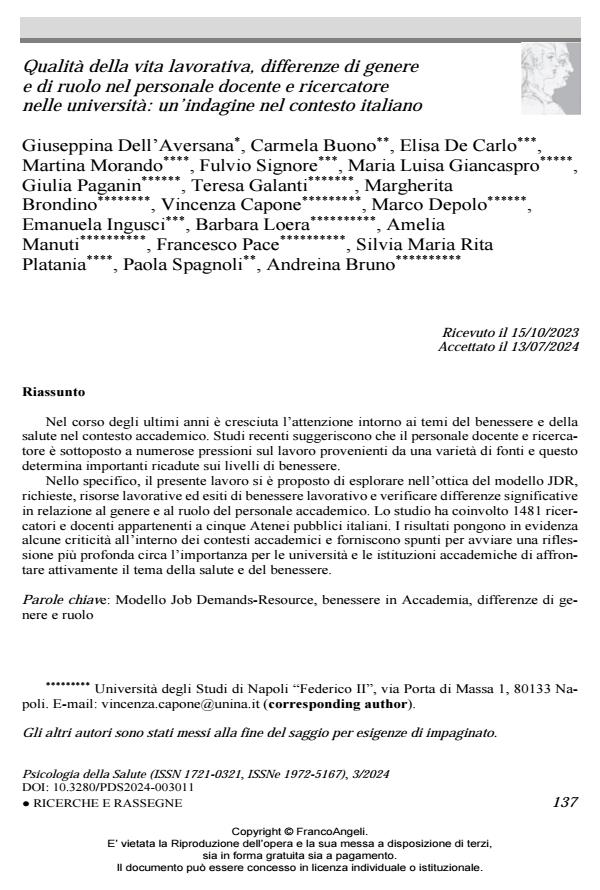Quality of working life, gender and role differences in university teaching and research staff: a survey in Italy
Journal title PSICOLOGIA DELLA SALUTE
Author/s Giuseppina Dell’Aversana, Carmela Buono, Elisa De Carlo, Martina Morando, Fulvio Signore, Maria Luisa Giancaspro, Giulia Paganin, Teresa Galanti, Margherita Brondino, Vincenza Capone, Marco Depolo, Emanuela Ingusci, Barbara Loera, Amelia Manuti, Francesco Pace, Silvia Maria Rita Platania, Paola Spagnoli, Andreina Bruno
Publishing Year 2024 Issue 2024/3
Language Italian Pages 24 P. 137-160 File size 330 KB
DOI 10.3280/PDS2024-003011
DOI is like a bar code for intellectual property: to have more infomation
click here
Below, you can see the article first page
If you want to buy this article in PDF format, you can do it, following the instructions to buy download credits

FrancoAngeli is member of Publishers International Linking Association, Inc (PILA), a not-for-profit association which run the CrossRef service enabling links to and from online scholarly content.
Over the past few years there has been increased attention to issues of well-being and health in academic settings. Recent studies suggest that university professors and researchers are subjected to increased work pressures from a variety of sources, resulting in important impacts on individual and organizational well-being. The present study aims to explore job demands and resources and test for significant differences in wellbeing in relation to gender and role. The study involved 1481 researchers and professors, of five Italian public universities. The results highlight some critical issues and provide insights to initiate deeper reflection about the importance for universities and academic institutions to actively address the issue of mental health and well-being.
Keywords: Job Demands-Resource Model, wellbeing in Academia, gender and role differences
Giuseppina Dell’Aversana, Carmela Buono, Elisa De Carlo, Martina Morando, Fulvio Signore, Maria Luisa Giancaspro, Giulia Paganin, Teresa Galanti, Margherita Brondino, Vincenza Capone, Marco Depolo, Emanuela Ingusci, Barbara Loera, Amelia Manuti, Francesco Pace, Silvia Maria Rita Platania, Paola Spagnoli, Andreina Bruno, Qualità della vita lavorativa, differenze di genere e di ruolo nel personale docente e ricercatore nelle università: un’indagine nel contesto italiano in "PSICOLOGIA DELLA SALUTE" 3/2024, pp 137-160, DOI: 10.3280/PDS2024-003011